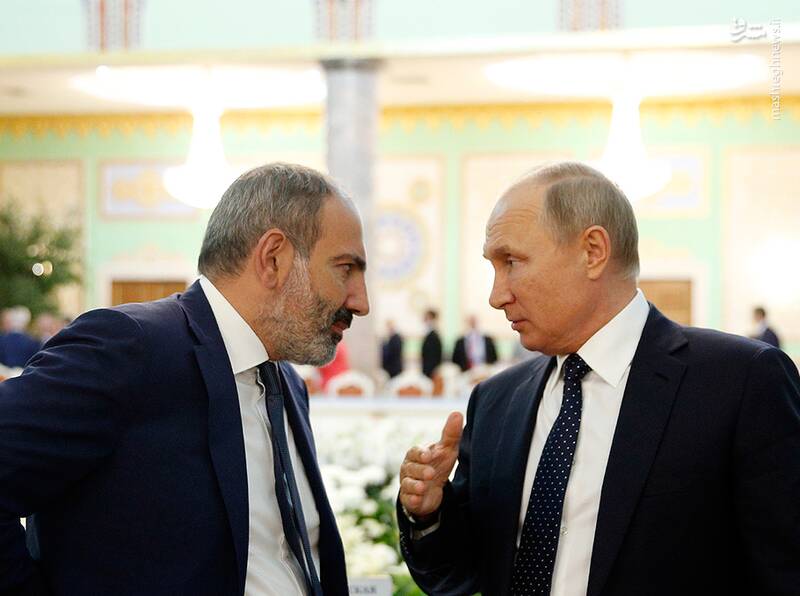Dr. Bahram Amirahmadian, in an interview with the website of the Strategic Council on Foreign Relations, referred to Armenia’s criticism of Russia that Moscow did not deliver the purchased weapons to that country despite the payment of the money, commented on the tensions in the relations between Yerevan and Moscow and noted: Considering Russia’s approach regarding Georgia and the secession of South Ossetia and Abkhazia from that country with the support of Russia for the separatists, Armenia has concluded that in the past years, instead of supporting that country, Russia has repeatedly imposed costs on it.
He added: Some people in Armenia believe that Russia has not invested in that country, and with the closed environment it has created for it, countries interested in investing in the Caucasus, including the European Union, did not invest in Armenia.
The university professor considered the Russian military base in “Gyumri” as being of no benefit to Armenia and added: During the 44-day war, the people and the government of Armenia expected Russia’s help, but Russia used the excuse that the Republic of Azerbaijan was fighting separatists within its borders, refused to help Armenia; while this has always been the situation and before Russia did not have such a position and would support Armenia.
According to Amirahmadian, the nationalist movements in Armenia believe that “Russia’s measures not only have no benefit for them but have imposed costs.” Russia creates insecurity in the Caucasus and is the cause of instability. Moscow was passive in maintaining the Lachin Corridor; not only was it not able to protect that corridor, but it did not take any measure against the extremists of the Republic of Azerbaijan and trampling on the rights of the Armenians living in that region. Finally, problems arose that after the siege, all Armenians moved from that area to Armenia, creating challenges for Yerevan as well. Meanwhile, the Armenians living in Karabakh were its main inhabitants, and that was their mainland.
He continued: Russia, perhaps because of the conflict in Ukraine, abandoned such issues. After those issues, Armenia realized that if a former Soviet republic does not want to cooperate with Russia, it would be punished and attacked like Ukraine. In addition, Armenia looked at Russia’s approach to the presidential elections in Belarus and intervention against the insecurity in Kazakhstan. In such a situation, the Armenian government has concluded that cooperation with Russia, even if it is within agreements such as the Collective Security Treaty, does not create security for it.
Emphasizing that Russia’s performance in the Caucasus was not a positive move, Amirahmadian stated that movements are being formed in Armenia and that there is no need to cooperate with Russia.
The university professor said that although Armenia had bought weapons from Russia before and needed them during the war, Russia did not give them to Armenia even though the money had been paid for it! Therefore, Armenia has concluded that cooperating closely with the international environment will be more suitable for them. Also, the war between the Republic of Azerbaijan and Armenia in Karabakh showed that the weapons made in Russia are not that effective as compared to the weapons made in the Zionist regime, Turkey, and the West.
Referring to Armenia’s efforts to get closer to European countries and some analyses that believe Russia has preferred the Republic of Azerbaijan to Armenia, Amirahmadian pointed out that although in the current process, it seems that Russia is leaning towards the Republic of Azerbaijan, in fact, that country is looking for its national interests. Moscow and Baku have already cooperated, and the Republic of Azerbaijan also pays attention to the Euro-Atlantic structures by balancing against Russia and Iran and has close and extensive cooperation and relations with Turkey, NATO, the United States, and the Israeli regime.
He explained: Some believe that Pashinyan is a pro-Western person, but it should be considered that he belongs to a movement that is not satisfied with Russia’s performance. This criticism of Russia is related to Pashinyan himself and the movement he is leading.
The university professor added that Russia’s approach in the Caucasus has led Armenia to this logic that Russia is not the power that can create peace and stability in the region and should find other colleagues and partners from the region or outside the region.










0 Comments